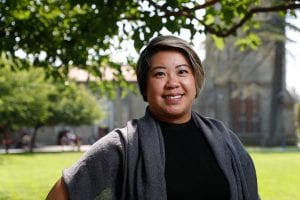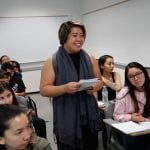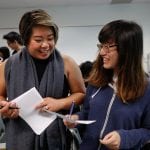
Assistant Professor Yvonne Kwan poses for a portrait on Wednesday, Aug. 22, 2018. (Photo: Jim Gensheimer)
Yvonne Kwan, a second-year assistant professor of Asian American studies in the Department of Sociology and Interdisciplinary Social Sciences, grew up in a working-class southern California city with a sizeable Latinx community. She said growing up, she learned little about Asian American history or culture during her K-12 education. It was not until she took an ethnic studies course in college that this first-generation Asian American began to feel connected to her cultural heritage. She changed her major from molecular biology to ethnic studies.
When she began dating a boyfriend who was Cambodian American, now her husband, she began to learn about Cambodian culture and the experience of refugees who lived through genocide to help her gain an understanding of her in-laws. But she also found a fertile area for research. Kwan’s scholarly work has provided enough insight to fill a book; she is in the process of finalizing a manuscript entitled, “Afterlives of Diaspora: Cambodian American Trauma and Memory.”
“Some children were born in refugee camps, but they are too young to remember,” Kwan said.
Her book posits that while social trauma may not be verbalized or articulated, children of survivors can still develop the capacity to both identify with and experience the pain of previous generations.
“The trauma of genocide can have an effect decades after the initial event,” she said.
Kwan’s research has found that while many of the Cambodian refugees who lived through the genocide do not talk about their experiences, the transmission of trauma happens through the silences and fragments within the family.
- Yvonne Kwan teaches in Clark Hall on Wednesday, Aug. 22, 2018. (Photo: Jim Gensheimer)
- Yvonne Kwan interacts with a student in Clark Hall on Wednesday, Aug. 22, 2018. (Photo: Jim Gensheimer)
“For the older generation there is so much pain and a lot of these people are Buddhist so suffering is a part of life and they don’t see the point in rehashing it,” Kwan said. “The next generation is using anything they can find to fill the void. They read a ton of books or listen to other people (outside their families) tell the story.”
Since joining the SJSU campus in fall 2017, Kwan has been active on a task force that aims to provide more support for Asian Pacific Islander Desi (South Asian) American (APIDA) students. The task force, which includes faculty, staff and students, aims to determine what resources will be most helpful to students with these cultural identities as well as how to break down myths about the groups.
Both from her research and early work on the task force, Kwan said she sees a need to connect students to resources, whether it be helping them navigate academic advising or providing mental health services in a space where they feel safe.
“Students don’t always know what they need and sometimes they don’t know what to ask for,” Kwan said.

